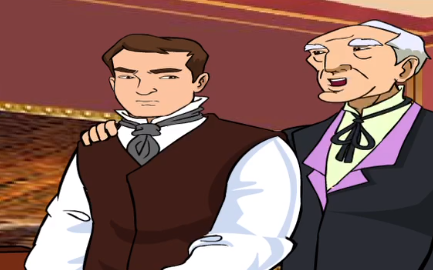El Filibusterismo (El Fili) – Chapter 15
Chapter Title: Senor Pasta
Setting: Senor Pasta’s house
Characters:
- Isagani
- Senor Pasta
- Padre Florentino (mentioned)
- Don Custodio (mentioned)
- Padre Irene (mentioned)
- Padre Fernandez (mentioned)
- Padre Sibyla (mentioned)
- High Official (mentioned)
Plot:
Isagani tries to convince Senor Pasta why he should support the petition for an Academy for Spanish while Senor Pasta tries to convince Isagani why the students should give up.
Chapter Summary:
Isagani goes to Senor Pasta’s house and waits for the line of clients to be done. When Isagani enters the study, Senor Pasta doesn’t pay him attention and continues writing. Then, Senor Pasta notices him and smiles and shakes Isagani’s hand. He asks about Isagani’s uncle (Padre Florentino). Isagani explains his reason for visiting. Senor Pasta pretends he doesn’t know about the students’ petition.
Isagani asks Senor Pasta to support them if ever Don Custodio asks for his advice. But Senor Pasta had always known about the petition and decided he would not get involved. He heard what happened in Los Banos. Padre Irene had lied to Macaraig because there were actually people who sided with the students:
- Padre Fernandez
- A countess
- A trader who wanted to sell items for the Academy
- High official
Padre Sibyla wanted time to decide so he remembered the Superior Commission and suggested.
Senor Pasta plans to confuse Isagani by using complex words. He begins by saying he is in a delicate position and cannot “compromise himself” even though he loves the country and has respect for people’s dreams. Senor Pasta mentions random quotes, laws and decrees. He thinks he has managed to confuse Isagani. He says it is “criminal” to go against authority because it damages the reputation of the authority.
Isagani argues that the government’s reputation should not matter because that is for the people to decide. Only justice or reason should matter. Senor Pasta is irritated that Isagani is able to argue back. He tells Isagani to let the government do its job.
Isagani argues that the government is supposed to provide people with what they need so the government should listen to people. Senor Pasta says the government is made up of the most qualified people so they know what’s right. Isagani argues that everyone has flaws so they should listen to opinions of others. Senor Pasta says that they should trust the government. Isagani says people should be able to ask the government what they want.
Senor Pasta says the government gives things without asking, and to ask is to assume the government is lacking. If one knows the government makes mistakes, then governments won’t be allowed to exist. Isagani argues that when people ask through legal means, it proves the government is helpful so people are actually praising the government by going to it for help. The government is not all-powerful and should not be offended, the same way people ask from God but God is not offended.
Isagani says that the government is a human institution that needs the help of all people and that Senor Pasta himself should know that if a government denies everything, it is not reliable. And if people hate the government, the only thing they should ask is that it lose its power.
Senor Pasta tries to argue that Isagani lacks life experience like the boys in Madrid who ask for reforms and get accused of subversion. Senor Pasta says it is hard to explain but the government has many reasons to deny the requests of people.
Senor Pasta is nervous and asks where his glasses are. Isagani points at them and Senor Pasta puts them on, pretending to read. He stutters, and says that because Isagani interrupted, he has forgotten what he was going to say. Senor Pasta then says he is busy.
Isagani stands to leave. Senor Pasta tells him that maybe the Vice-Rector (Padre Sibyla) is against the way Spanish should be taught to students, but not the concept. Senor Pasta says that the Rector has a project to reform education. He tells Isagani to study and that Isagani shouldn’t care since he knows Spanish already. Isagani says he visited for those who cannot study Spanish.
Senor Pasta says that Isagani managed to learn it and so did he, so others can do the same. He explains that he was a servant to friars and learned, without need for teachers, academies or permits from the government. Isagani asks how many people who wanted to learn ended up like Senor Pasta. Senor Pasta says many became lawyers, clerks and doctors, and that there are too many. More people should be farmers.
Isagani says many towns lack doctors and lawyers and even if there are enough, towns need those of better quality. And even farmers deserve an education so they can perfect their work. Senor Pasta says that since Isagani will become a doctor he should focus on medicine. He tells Isagani to stop thinking about the country and instead he should go to mass and focus on himself. He says Isagani will realize Senor Pasta was correct, when his hair is also white.
Isagani says that each white hair will be a “thorn” and he will feel shame if he sees that he only worked for himself without helping the country. He leaves.
Senor Pasta feels pity for Isagani because he was like that once. Thinking like that will not get Isagani food or glory. He calls Isagani a “poor young man”, and also feels sorry for Padre Florentino.
Trivia:
Quotes:
Senor Pasta: This is a country of projects!
Senor Pasta: No one exceeds me in love of country and in progressive aspirations, but… I cannot compromise myself.
Isagani: We pursue the same end, and only differ in the means.
Senor Pasta: It is clearly laudable to help the government when one helps it with submissiveness.
Isagani: For colonial governments the foundation of prestige is the weakest, because it does not depend on them, but on the free will of the governed while they wish to recognize it… The foundation of justice or reason appears to me more durable.
Isagani: Governments were set up for the welfare of the people, and to comply properly with their end they must follow the manifestations of the citizens, who best know their needs.
Senor Pasta: Those who form the government are also citizens, and among the most distinguished.
Isagani: But, as men, they are fallible and they should not ignore the opinions of others.
Senor Pasta: You have to trust them; they have to take care of everything.
Isagani: There is a Spanish saying which says he who does not cry does not get milk. He who does not ask is not given.
Senor Pasta: On the contrary! With the government exactly the opposite happens.
Isagani: You yourself know that it is a tyrannical and despotic government that, to display its power and independence, denies everything out of fear and suspicion.
Isagani: A people who detest their government should not demand more of it than that it abdicate its power.
Senor Pasta: He who desires to learn, learns and comes to know.
Isagani: Undoubtedly, there are many doctors and lawyers, but I will not say we have a surplus, since we have towns that sorely lack them, but if they abound in quantity; perhaps we lack them in quality.
Senor Pasta: Bah, bah, bah! To be a good farmer, there is no need for much rhetoric. Dreams, illusions, ideology! Eeea!
Senor Pasta: Distance yourself from all things that relate to the general condition of the country; hear mass, go to confession and communion when the others do, and you will see afterwards how you will thank me, and I will see it if I still live. Always remember that charity well understood begins at home; man should not look in this world for more than the greatest sum of happiness for himself, as Bentham says.
Senor Pasta: A crown of laurels drenched in aloes, dried leaves which hide thorns and worms. That is not life, that does not bring home food, nor does it win honors; the laurels hardly serve as sauce… nor give one tranquility… nor win lawsuits – on the contrary!






